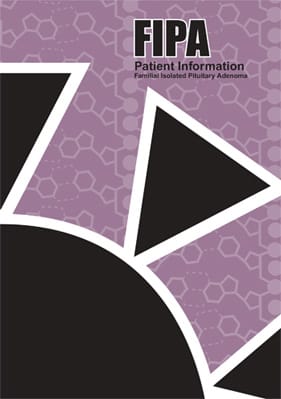The pituitary gland sits near the base of the brain behind the nose in a bony box called the sella turcica, and is roughly the size and shape of a bean. It is part of the body’s endocrine system, which is made up of a number of glands that release hormones (the body’s chemical messengers) into the bloodstream. Pituitary hormones are important for growth and development, metabolism (turning food into energy) and reproduction.
What is Familial Isolated Pituitary Adenoma?
A pituitary adenoma is a slow-growing and benign (non-cancerous) tumour of the pituitary gland which occurs in about 1 person in every 1000. Only 5% (1 in 20) of these tumours are hereditary, meaning that they are passed down through families. Familial Isolated Pituitary Adenoma (FIPA) is one of a small number of rare genetic disorders that can cause hereditary pituitary tumours.
Patients diagnosed with FIPA are said to have ‘isolated’ pituitary adenomas because, unlike in some other hereditary endocrine disorders, they do not have an increased risk of developing tumours in any other glands in the body.
Some pituitary gland tumours may produce abnormally increased amounts of hormones which in turn can cause a variety of symptoms.
These growths may be detected using blood and urine tests as well as several different types of scan. Treatment involves an operation to remove the gland and growth. A period of medication before surgery is necessary to control the unstable blood pressure. If both adrenal glands are removed, lifelong medication is necessary.
Further Reading
For further detailed information on Familial Isolated Pituitary Adenoma (FIPA), please read the AMEND Patient information Book which was produced in August 2012 with the assistance of the AMEND Medical Advisory Team and Professor Marta Korbonits from St Bartholomew’s Hospital in London.
We recommend that you discuss the contents of this book with your specialist – it is not for use in self-diagnosis, and not all of the information it contains may be relevant to you.
-
FIPA Patient Information Book

1st Edition (2012) of AMEND's Patient Information Book on Familial Isolated Pituitary Adenoma (FIPA)
View Booklet
Author: Jo Grey, AMEND CEO, with the help of the AMEND Medical Advisory Team
References and Information Production
Be involved
-
Make a donation
AMEND has a variety of ways to donate to show your appreciation for our work.
Donate now
-
Become an AMEND member
Membership is free so come and join our family
Join us
-
Latest News
AMEND is pleased to bring you our latest publication: ‘Starting a Family: Your Choices’. Funded by a grant from the Society for Endocrinology, this…
View News

